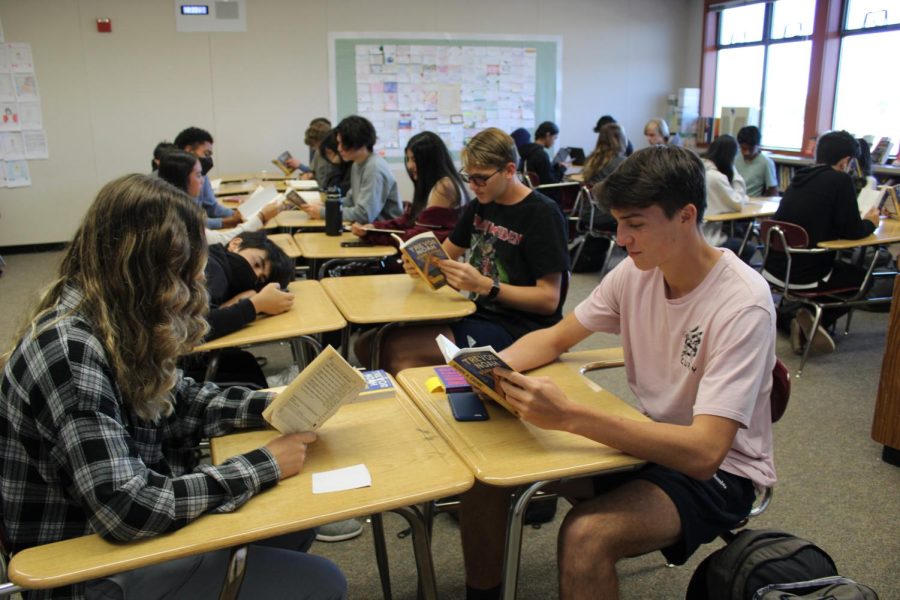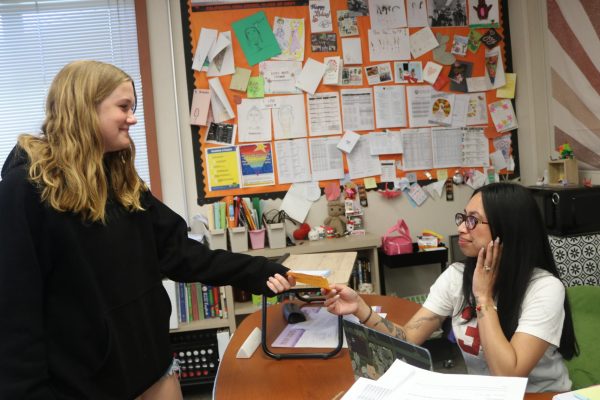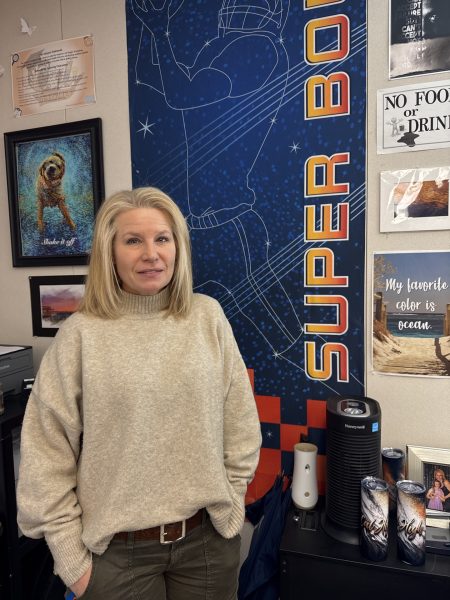English novels leave lasting impact
Teachers try to select most meaningful books to teach in their curriculums
Sophomore Aidan Dube reads the book “Born a Crime” by Trevor Noah with other students in his English class.
Reading English novels such as “Maus” and “Animal Farm” changed sophomore Hritvik Hooda’s worldview.
“[The books] showed how hard the Jewish people were in the fight to survive and it gives me inspiration to fight as well and not give up on school,” Hooda said.
Required reading might sound like a nuisance for many students, but some say these English novels can have unexpected positive effects.
“I read ‘Wonder’ in fifth grade and it stuck with me,” freshman Maathini Vijayanand said. “It introduced me to the idea that there are kids living completely different lives than me, who look different and behave different.”
But not all students feel as though English novels have meaningfully affected them.
“I wouldn’t call [the books] boring but I also wouldn’t call it impactful,” junior and AP Language student Eddie Siladie said.
Added junior AP Language student Alex Clark, “To me [the books assigned] are all about lovers who can’t be together. I can’t really relate.”
English teachers, who have the flexibility to choose the books they teach, say that novels provide students with a chance to contemplate the deeper themes of the books.
“Stories with more universal themes tend to be more popular,” Global Studies English teacher Regina Lyon said. “[English teachers] try to avoid books with large amounts of loaded language with no purpose, or stories with loaded profanity with an unclear ultimate goal.”
Lyon, who is one of the English department’s curriculum leaders, said books students read as freshmen and sophomores, including “Animal Farm” and “The Alchemist”, contain more universal themes and stories that connect to teenage life.
But English teacher Ted Levey noticed that the plots and lessons of these books become less relatable to students as grade levels progresses.
“Sometimes when we read these books in high school, [students] are not ready for them,” Levy said. “So they might come back to this book in their 20s or 30s.”
In later years of high school, English teachers select novels that tend to contain more complexity, making them more challenging for students to dissect, English 12 teacher Alyssa Anderson said.
“At the 12th grade level, I expect that you already know that baseline [making connections with characters],” Anderson said. “So then I’m thinking, let’s now make connections […] with the outside world, with your prior experience, with your current experience.”
Cal High alumnus Kareem Alba, who graduated in June, said he has grown to appreciate how the deep themes in high school books have helped him think critically.
“They’ve definitely helped to change the way I see the world,” Alba said. “These books are filled with nuanced topics that help me realize that not everything can be boiled down to black and white and that I have to critically analyze everything.”
Alba said the novels he read at Cal directly helped him succeed in college at UCLA.
“College is a place where you’re pushed out of your bubble and I’ve interacted with so many people from so many different backgrounds,” Alba said. “I’ve used the lessons I’ve learned from these books throughout my college experience.”
Vijayanand said the novels that students read in English shape their future reading choices.
“The books we read in high school influence what books we read as adults,” Vijayanand said. “That’s why I think it’s important to include more diversity into our curriculums and to broaden the topics we read about.”

Senior Kathir Rajesh Kannan is one of the reporters for The Californian. This is his first year in Newspaper and he's very interested in finding out others’...

Junior Nidhay Mahavadi is a Staff Writer for The Californian and this is his first year at Cal High. His hobbies outside of school he enjoys are going...

Senior, Anvi Kataria is both Opinion and Podcast Editor for this school year. This is her third year on the Californian staff and is looking forward to...





